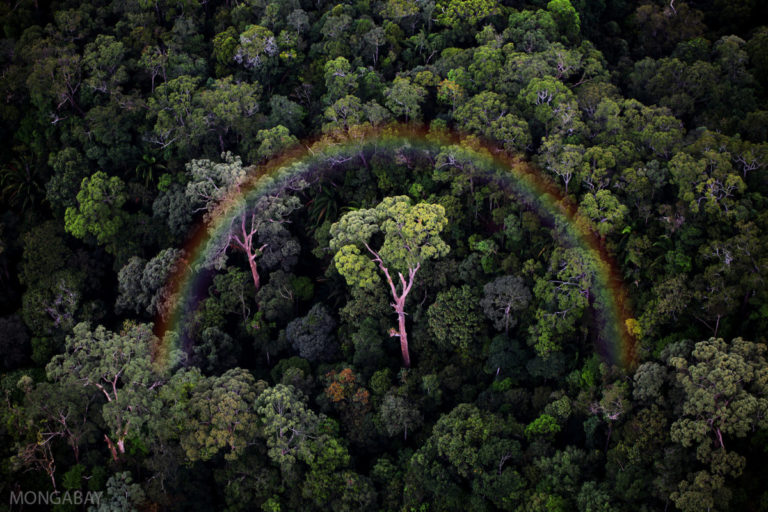Palm oil plantations decimating orang-utans says report
Friends of the Earth release
September 23, 2005

Orangutan in Sumatra. Photo by Jennifer Caldwell.
UK company demand for palm oil, a vegetable oil found in one in ten products on supermarket shelves, is driving the orang-utan towards extinction, new research reveals. The `Oil for Ape Scandal’ [PDF], published today by Friends of the Earth and the world’s leading orang-utan conservation groups, concludes that without urgent intervention the palm oil trade could cause the extinction of Asia’s only great ape within 12 years.
Palm oil is found in a diverse range of products on our supermarket shelves, from bread, crisps, margarine and cereals to lipstick and soap. Despite being warned for years by environmental groups that oil-palm plantations are associated with rainforest destruction as well as human rights abuse, the report finds that most UK companies do not even know where their palm oil comes from.
The report finds that almost 90 percent of the orang-utan’s habitat in Indonesia and Malaysia has now been destroyed. Some experts estimate that 5,000 orang-utan perish as a result every year. The researchers found that oil-palm plantations have now become the primary cause of the orang-utans’ decline, wiping out its rainforest home in Borneo and Sumatra.
New evidence shows that orang-utan rescue centres in Indonesia are over-flowing with orphaned baby orang-utans rescued from forests being cleared to make way for oil-palm plantations. The Indonesian Government is now planning to convert a significant area of Tanjung Puting National Park, the world’s most famous protected area for orang-utan, into an oil-palm plantation.
Research by Friends of the Earth found that at least 84 per cent of UK companies are failing to take effective action to ensure they do not buy palm oil from destructive sources and that not one single UK supermarket knows where the palm oil originates in the products it sells.
Friends of the Earth and orang-utan conservation groups say that the failure of UK companies to take action shows that they cannot be trusted to act responsibly. They are calling on the UK Government to give company directors a legal duty to minimise their environmental impacts through the Company Law Reform Bill, which will have its first reading in Parliament later this year.
|
Two weeks ago the United Nations published the Kinshasa Declaration, an action plan backed by the UK Government to protect crucial forest areas and save the world’s great apes from extinction [2]. The Indonesian Government signed on to this agreement but so far Malaysia has failed to do so. Friends of the Earth and the orang-utan conservation groups urge both Governments to implement the declaration and end the conversion of orang-utan habitat into oil-palm plantations.
Friends of the Earth Palm Oil Campaigner Ed Matthew said:
“While the UK Government is prepared to fund international ape conservation it is failing to clean up its own back yard. Over 100 UK companies and every single British supermarket is helping fuel the obliteration of orang-utan habitat. The Government must amend the Company Law Reform Bill to stop UK companies acting so destructively.”
Ian Redmond, Chairman of the Ape Alliance, said:
“Governments in countries like the UK that provide a market for palm oil must legislate to make their corporations responsible and accountable for their impacts. If not, it is we who will have to explain to our children that the orang-utan became extinct, not because of a lack of knowledge, but because of corporate greed and a lack of political will.”
Research by Friends of the Earth shows that the forest fires which ravaged the island of Sumatra in August, and continue to burn today, were mostly set by palm oil companies clearing land to set up their plantations. It is estimated that one third of the orang-utan population on Borneo was killed by the forest fires of 1998.
Dr Willie Smits, Founder of the Borneo Orangutan Survival Foundation, said:
“The rate of loss of orang-utan has never been greater than in the last three years, and oil- palm plantations are mostly to blame.”
Professor Biruté Galdikas, founder of the Orangutan Foundation International, said:
“The orang-utan is endangered because of habitat loss. Today the greatest threat to orang-utan habitat is the continued expansion of oil-palm plantations. Palm oil is the greatest enemy of orang-utan and their continued survival in the wild.”
Dr Ian Singleton, Scientific Director for the Sumatran Orangutan Conservation Programme, said:
“We have already lost huge areas of orang-utan habitat and tens of thousands of orang-utan to the palm oil industry. Now there are reports of an “oil-palm fence” which will stretch 845 kilometres along the border with Malaysia in Borneo, crossing through orang-utan habitat. The problem is truly immense.”
Pictures of orang-utan can be downloaded from http://www.foe.co.uk/resource/images/orangutan_report/
Broadcast quality footage of orang-utans and oil palm plantations is available from the press office at Friends of the Earth with thanks to the Orangutan Foundation.
Interviews with leading orang-utan scientists and campaigners are available.
Contact details:
Friends of the Earth
26-28 Underwood St.
LONDON
N1 7JQ
Tel: 020 7490 1555
Fax: 020 7490 0881
Website: www.foe.co.uk
This is a modified press release from Friends of the Earth. This original can be found at http://www.foe.co.uk/campaigns/corporates/news/orangutan_report.html













